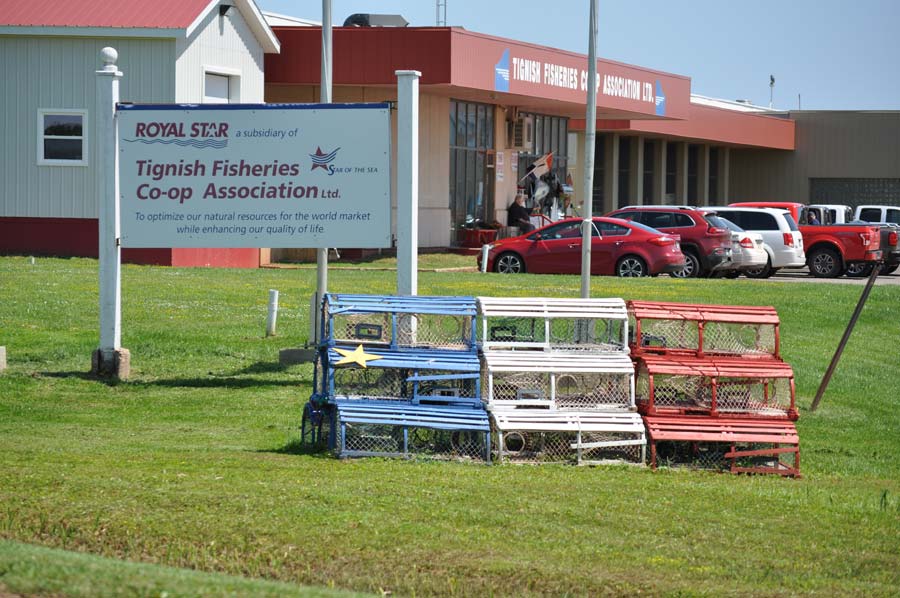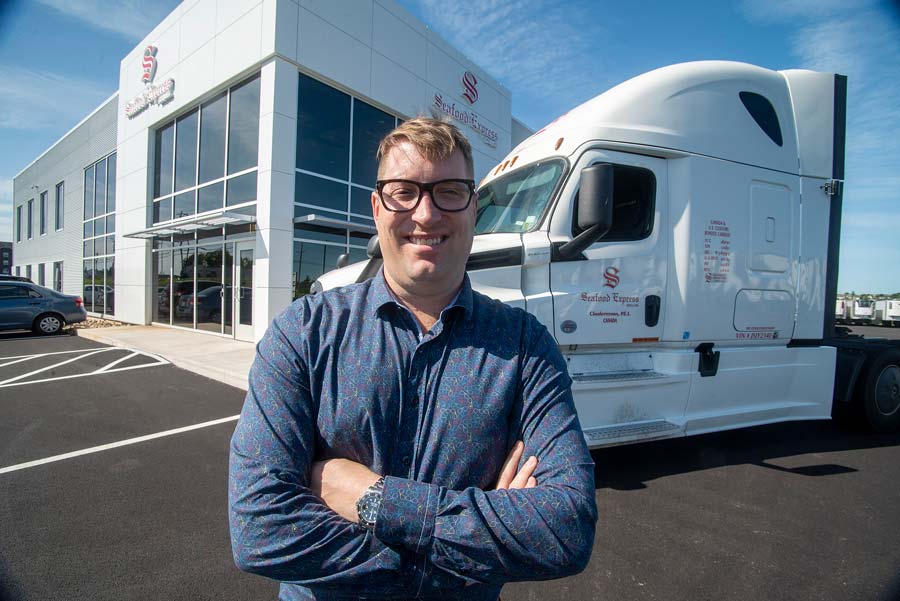Owner and VP Andy Keith proud of new expansion in Charlottetown
Large, bright, and shiny are words that come to mind as a first impression of the new Charlottetown location for Seafood Express, but a conversation with owner/vice president Andy Keith reveals that the business of food transport is far from superficial, with plenty of complex challenges.
“We have up to 140 on staff here, including almost 100 drivers,” Keith said. “And since our recent expansion we have about 85 trucks in service. Like every other sector, technology advances are constantly changing the way we do business.”
Previous to the newly constructed high-profile headquarters at the corner of Sherwood and Malpeque Roads, Seafood Express operated out of a 70-year-old building on the Upton Road. As the company continued to grow, it required much more space. The new location has plenty of room for parking the company’s bright white trucks as well as room for expansion. The stylish structure, designed by Coles Associates, houses about 40 administrative staff as well as dorm space for drivers that includes a TV lounge, a fitness room packed with equipment, and rooms for sleeping. Plenty of light and bright colours make for a pleasant working environment, and fun touches like an ‘asphalt highway’ style corridor and an iPad sign-in process suggest a forward-looking atmosphere with a sense of fun.

ng’s highway inspired lobby Photo credit: Brian McInnis
Andy Keith is a second-generation owner at Seafood Express; his dad Bill purchased the business in 1986 and Andy spent some summers helping out in the transport company. After a time studying, working in Halifax, and operating his own web development business, Andy was ready to move back to PEI about five years ago, taking the lead in day-to-day operations at Seafood Express.
“Finding and keeping qualified drivers is always a challenge,” Keith said. “Most of our drivers are from overseas with around a third from Jamaica and a quarter from India. They usually arrive with good qualifications and we enhance their training with extensive orientation and an in-house program. We are pleased to see that many drivers become very much a part of our community having invited their families to establish homes here over time.”
Seafood Express specializes in temperature-controlled transportation of food goods, and only about 10-15% is actually fish product. Many of the trucks are carrying fresh and frozen PEI potatoes and other processed food that requires cooling to markets along the eastern seaboard of the US, as far west as California, and to Ontario and beyond. As well, Seafood Express makes regular runs to the Halifax container port.
There are many challenges and variables to consider when operating a food transportation business. Even the weather is a factor, especially for PEI-based transporters, and frequent bridge closures, such as those in in 2018, certainly pose problems for trucking companies. The changing cost of fuel is a major issue, but Keith has instituted a number of strategies to reduce fuel consumption. “We have reduced idling times from 30-40% to less than 10% through various measures,” Keith said. “Cabs have an auxiliary power unit to keep drivers warm or cool, and our drivers actually receive an incentive to reduce idling.” As well, all trucks are designed for best aerodynamics and adjusted regularly for greatest fuel efficiency–good for business and the environment.

Mechanics Billy Kelly and Randy Millar are an integral part of the Seafood Express team
Photo credit: Brian McInnis
Technology plays a role in other aspects of the food transport process these days; from electronic filing of border-crossing paperwork, electronic logs for all drivers, use of two-way dash cams, and tracking routes with GPS, to remote monitoring of temperature inside the cargo space, ensuring correct handling of all food items.
In fact, food safety plays an important role in the Seafood Express operation. They are certified HACCP (hazard analysis and critical control points) carriers, an internationally recognized system used to enhance food safety throughout the food chain.
In terms of locally-produced food products, probably none is more delicate or time-sensitive than fresh seafood. Prince Edward Aqua Farms in New London, PEI ships their mussels, oysters, and clams across the US and Canada. General Manager Jerry Bidgood said, “Preparing and packaging the shellfish in a timely manner is key, but even with a very quick turnaround inside our plant, we are dependent on weather and other factors when it comes to shipping.” For example, the plant staff tend to listen closely to wind forecasts and adjust shipping to prevent delays at Confederation Bridge.
Prince Edward Aqua Farms has noted good growth in all products, which supports the expansion in the local trucking sector, and Bidgood observed that farmed oyster production in particular has almost tripled in the past few years. “The cultivated oysters are consistent in shape and size and are definitely filling a need in the marketplace,” Bidgood said.

You can’t miss the company’s trucks with their new corner location Photo credit Brian McInnis
Royal Star Foods ships throughout North America as well, but a good part of their market is overseas. A subsidiary of Tignish Fisheries Co-op Association, Royal Star is the largest lobster processor on Prince Edward Island. Operating since 1922, the co-op has 200 fisher members and 375-400 employees. Royal Star is open from April to the end of February and operates a retail fish market on the site as well.
Manager Francis Morrissey said the plant sends both live and frozen shellfish to markets in Asia, Europe, and the Middle East. The list is almost too long to mention, but: Japan, Korea, Taiwan, Hong Kong, China, and Vietnam in Asia; Germany, France, Italy, Spain, Portugal, Switzerland, Belgium, Sweden, Denmark, Poland and Ukraine in Europe; and Kuwait, Dubai, Israel, and Saudi Arabia in the Middle East.
“Our products go by truck to the container port in Halifax,” Morrissey said, “or we send live lobster and other shellfish by truck to airports like Charlottetown, Moncton, or Halifax. For frozen shellfish, we pack the containers right on site.”
A shipment of live lobster, packed on ice in styrofoam containers, can leave Tignish and reach a supermarket in France within 24 hours or an Asian destination within 36.

Royal Star, in Tignish, ships seafood internationally Photo credit: Laura Weatherbie/Salty
Royal Star also ships live snow crab, and whole fresh tuna. “We remove the head, and the rest of the tuna is shipped by air, mainly to Japan,” Morrissey said.
Islanders might be surprised to learn that PEI food products from a fish plant in Tignish are reaching customers in Vietnam, the Ukraine, or Dubai. Canada’s Food Island–or is it the World’s Food Island?
As an island, PEI has the bounty of our surrounding waters teeming with rich seafood, but this adds challenges when transporting those fragile foods to far-flung markets.
PEI transporters, producers, and processors are working together to ensure that the high-quality seafood harvested here reaches customers in the best possible condition, maintaining that first-class reputation of ‘Canada’s Food Island.’
For Keith an important measure of success is delivering a reliable and professional service and creating a place where people want to work. If comfortable rest spaces for drivers, adoption of new technologies for improved efficiency, and a fresh bright workplace are any measure, then he has met his goal.
- ROYAL STAR FOODS FOCUSES ON ENVIRONMENT - December 2, 2019
- TO SEE THE WORLD IN…AN OYSTER SHELL - October 1, 2019
- SEAFOOD EXPRESS MOVES MORE - August 1, 2019
- Shellfish Venture in Souris - October 1, 2018
- SUMMER’S NOT OVER AND NEITHER IS LOBSTER SEASON - August 1, 2018


